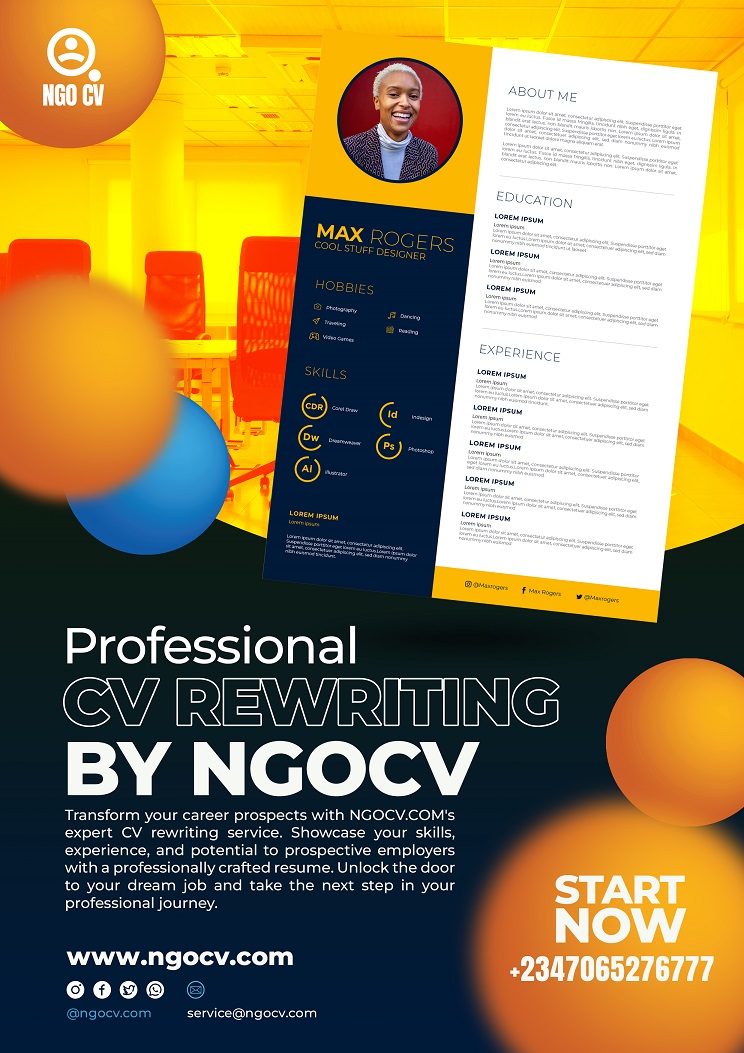
United Nations International Children’s Emergency Fund (UNICEF) works in some of the world’s toughest places, to reach the world’s most disadvantaged children. To save their lives. To defend their rights. To help them fulfill their potential. Across 190 countries and territories, we work for every child, everywhere, every day, to build a better world for everyone.
We are recruiting to fill the position below:
Job Title: Consultant (International Education)
Job No.: 544215
Location: Maiduguri, Nigeria
Level: Consultancy
Categories: Education
Contract type: Consultancy
Duration of the contract: 60 days from the date of the signing of the contract.
Purpose of the Consultancy
- Ensure the Sector has realistic and contextualized Minimum Standards for Education in Emergency for northeast based on child right and the ability to apply them in practice that will be used by all Education actors in accordance with existing strategies and guidance under Government Ministries, Departments and Agencies (MDAs) authority and Communities.
Scope of Work
- The Education Sector has developed a strategy that links the Education in emergency response and early recovery targeted by the government. This strategy is aligned with different texts and guidelines of the education sector and the nexus approach. The Education Sector Strategy will help all the partners involved in the education sector (donors, governmental actors, INGO, multilateral agencies, etc.) in their assistance to vulnerable communities.
- Given the education sector’s challenges (Facing different approaches in programme implementation, lack of minimum standards in different areas of education at Northeast level, …), the Education Sector Strategy needs to be completed with minimum standards to allow actors to understand what activity should be done when, where and how.
- The minimum requirement of every activity and the context in which that activity should be implemented. In the northeast LGA are not in the context, taking in account the nexus (emergency – recovery – development) it’s crucial for the Education sector to have a clear frame that explain activities In each context and provide minimum standards for every key activity with specific attention to cross cutting topics such MHPSS, Gender and children with disabilities.
- Under the guidance of the Education Sector Coordinator, the Consultant will work with sector partners and the government line-ministry and other relevant stakeholders (State Universal Basic Education Board -SUBEB-, Child Protection, WASH, GBV Sectors, OCHA, Global Education Cluster, beneficiaries, including children, etc.) to develop a Minimum Standards for Education in Emergencies (NMSEE) for NE Nigeria, with attention to cross-cutting thematic, aligned to the Education in Emergency multiyear strategy 2021 – 2023.
- The EiE minimum standards will cover the Northeast (BAY States) comprising all targeted Local Government Area (LGAs) in the EiE multiyear strategy, and will be aligned to existing documents and will focus on formal and non-formal education (considering different educational actors: children/students, education authorities, implementing organisations, teachers/heads, parents/carers, school management, students and others) located in IDP campsites and host communities (for the latter, the facilities that have hosted or are hosting IDPs).
- In coordination with FME, SMoE (SUBEB, …), EiE SAG and in collaboration with Child Protection, WASH and GBV Sectors the consultant will first conduct a desk review of existing national and State minimum standard in EiE. Tasks include:
Inception phase
- Conduct a desk review of existing national standards, guidelines, norms etc., identifying what is and what is not being put into practice. (Minimum for basic Education, …).
- Develop a SWOT Analysis.
- Develop a list of key stakeholders, including children, to engage for inputs to identify gaps and discuss existing minimum standards.
- Write a short inception report with a detailed activity plan, tools and timeframe.
Consultation with Stakeholders (Government, Development Actors, EiEWG Members, Communities including Children)
- Develop the necessary tools to carry out consultations with the different stakeholders: education authorities, implementing NGOs in the education sector, Child Protection/Wash/GBV Sectors, beneficiaries, including learners/children in formal and non-formal education. These tools should identify existing standards and highlight gaps. It’ll be an opportunity also to understand and highlight how international norms (INNEE) should be complementary to exiting (national and EiEWG) minimum standard in Country.
- Establish a plan and timeline for consultations at all level and initiate contact with stakeholders.
- Implement the consultation plan.
Minimum Standard
- In consultation with all relevant partners, provide a draft of minimum standards in Education in emergency, with attention to MHPSS, Gender & Inclusion of children with disabilities
- These minimum standards should be aligned to Nigerian norms and the EiE Sector Strategy and response plan and should include at least the following sections:
Objectives and Sector mandate:
- General considerations.
- Overview on EiE response strategy
- Minimum requirements for EiE activity.
- Sector approaches
- Cross-cutting thematic
- Technical orientations
- Legal frame for key activities
- Recommendations
- Annexes
Validation Workshop:
- Conduct validation workshops to present and discuss the draft with the government, representatives of stakeholder groups, including children and key partners.
- Update the minimum standards based on the feedback and suggestions provided during the validation workshops.
Orientation Session to Partners in all Sectors – BAY:
- With support of the EiEWG secretariat, to develop and conduct an orientation session to explain and launch the operationalization of these minimum standards.
Minimum Requirements
- An advanced university Degree (Master’s or Higher) in Education, International Law, Human Rights, Political Science, or International Affairs or a relevant Technical field.
- A minimum of 5 years of relevant professional experience in humanitarian affairs, human rights, child protection, emergency preparedness, crisis/emergency relief management, rehabilitation, reintegration and development, or other related area.
- Experience in Development of Minimum Standards for Education in Emergency is required.
- Developing country work experience and/or familiarity with emergency is considered an asset.
- Familiarity with the UN coordination mechanisms (Cluster, Sector, ICC, ISWG, OCHA, etc) is an asset.
- Fluency in written and spoken English is required.
Application Closing Date
5th September, 2021; W. Central Africa Standard Time.
How to Apply
Interested and qualified candidates should:
Click here to apply online
Important Information and Notice
- Consultant is required to spend 47 days in the field including 7 days quarantine at Abuja on arrival
- Candidate is required to submit a detailed technical proposal along with the application and application without this will not be accepted.




